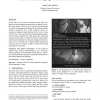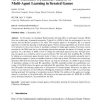41 search results - page 7 / 9 » Applying game design theory to virtual heritage environments |
CIE
2004
Springer
13 years 7 months ago
2004
Springer
Recent advances in computer graphics, particularly in real-time rendering, have caused major improvements in 3D graphics and rendering techniques used in interactive entertainment...
VEE
2006
ACM
14 years 1 months ago
2006
ACM
The Pi-calculus is a formalism to model and reason about highly concurrent and dynamic systems. Most of the expressive power of the language comes from the ability to pass communi...
OOPSLA
2010
Springer
13 years 5 months ago
2010
Springer
In this paper we provide an experience report where language oriented programming approaches are applied to complex game design. Ficticious is a G-expression based pidgin of sever...
AAMAS
2006
Springer
13 years 7 months ago
2006
Springer
In this paper, we investigate Reinforcement learning (RL) in multi-agent systems (MAS) from an evolutionary dynamical perspective. Typical for a MAS is that the environment is not ...
JSAC
2007
13 years 7 months ago
2007
— One of the distinctive features in a wireless ad hoc network is lack of any central controller or single point of authority, in which each node/link then makes its own decision...


